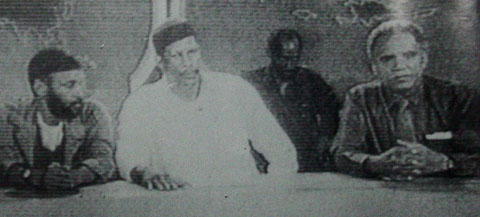Jamaat al Muslimeen leader Yasin Abu Bakr (centre, in white) and journalist Jones P. Madeira (right) on live television during the 1990 insurrection. TTT image later reproduced in the Trinidad and Tobago newspapers
“At 6.00 pm this afternoon the government of Trinidad and Tobago was overthrown.”
On the evening of 27 July, 1990, these were the words that informed a shocked nation that a group of armed insurrectionists had stormed Trinidad and Tobago’s Red House and sole TV station, and were holding the prime minister hostage, along with several dozen Cabinet ministers, MPs, journalists, and others. Yasin Abu Bakr, the leader of the Jamaat al Muslimeen, appeared on television and calmly announced that “the revolutionary forces are commanded to control the streets.”
It was a huge bluff, of course, or a delusion. The Muslimeen never controlled more than a few thousand square feet of territory in Port of Spain. They were outgunned, had no popular support, and there was never any chance their coup attempt would succeed, though for five days there was a very real risk that most or all of their hostages would be killed. Trying to avoid bloodshed, the authorities negotiating with Abu Bakr secured the Muslimeen’s surrender on 1 August — Emancipation Day — by means of the infamous amnesty which led, after some judicial wrangling, to their walking free.
The Muslimeen would go on to become a potent and dangerous political force in Trinidad and Tobago, credited with or blamed for intervening in several general elections. Abu Bakr remains controversial, hated by most, admired by a crucial few. To this day many Trinidadians, not otherwise bloodthirsty, openly express the opinion that he should have been killed by the security forces in the aftermath of the insurrection, amnesty or no amnesty. Downtown Port of Spain is still scarred by the fires and pillaging that erupted on the night of 27 July. And many believe that the atmosphere of violence that has prevailed in recent years can be traced back to the events of 1990. As Mark Lyndersay put it, writing in the May 2008 CRB:
There’s a popular argument that the coup attempt in Trinidad and Tobago changed this twin-island nation forever, that the growth of violent crime over the last decade can be traced back to that act of pointless lawlessness and the distribution of guns on the evening of July 27, 1990.
Lyndersay — who, as a Trinidad Guardian photojournalist, was perilously close to the centre of the action during those five days in 1990 — was reviewing Days of Wrath, journalist Raoul Pantin’s account of being held hostage inside the TTT building. Dennis McComie has more recently published his 1990: The Personal Account of a Journalist Under Siege, and in 1992 Eden Shand — a former government minister and Muslimeen hostage — published The Estates Within, a “docu-drama” play based on events inside the Red House during the insurrection. But, as Lyndersay wrote in his review of Pantin’s book,
The 1990 insurrection is much like the proverbial elephant described by blind men. There were so many aspects to the event that have never been publicly discussed or narrated by those who experienced them that it’s possible no one has a truly comprehensive overview of the coup attempt. After almost two decades, all that is publicly available about the Muslimeen insurrection are a few facets on a complicated and still disturbing event, little windows into what happened over those puzzling, terrifying days.
Which is why many Trinidadians were relieved when recently elected Prime Minister Kamla Persad-Bissessar announced her government’s intention to appoint a commission of enquiry into the coup attempt. For twenty years, successive governments ignored calls from citizens both prominent and ordinary for a formal probe. It is widely believed that key Opposition MPs, fortuitously absent from the Red House on that fateful Friday evening, had been tipped off about the Muslimeen’s plans, and important aspects of the negotiations over the notorious amnesty remain unknown to the public. Almost a generation later, it’s time to face the truth and its consequences.






{ 1 comment… read it below or add one }
Thanks for the post Nicholas. What bothers me is the number of people – many of them born after the coup, or at least after 1985 – who see this as “a waste of money” or something of the sort. I suppose it makes sense – it has been swept under the rug for twenty years now, how are they supposed to know about it? Would I have cared about a commission of inquiry looking into events of the Black Power revolution in 1990? Or perhaps, to pick something a bit closer to the truth – did I care about honouring Jean Miles in in July 1990? It was ancient history, something I barely understood.
I suppose you had to live through it…